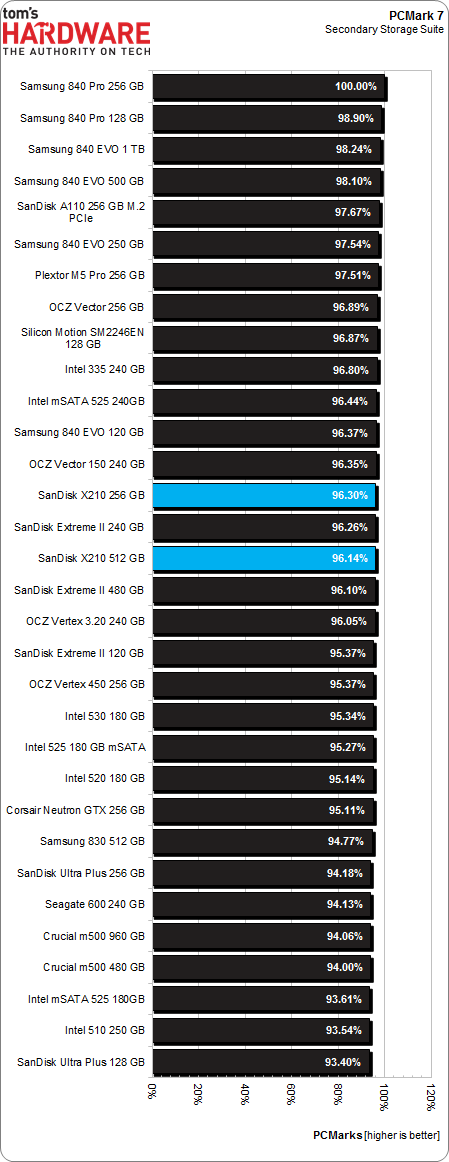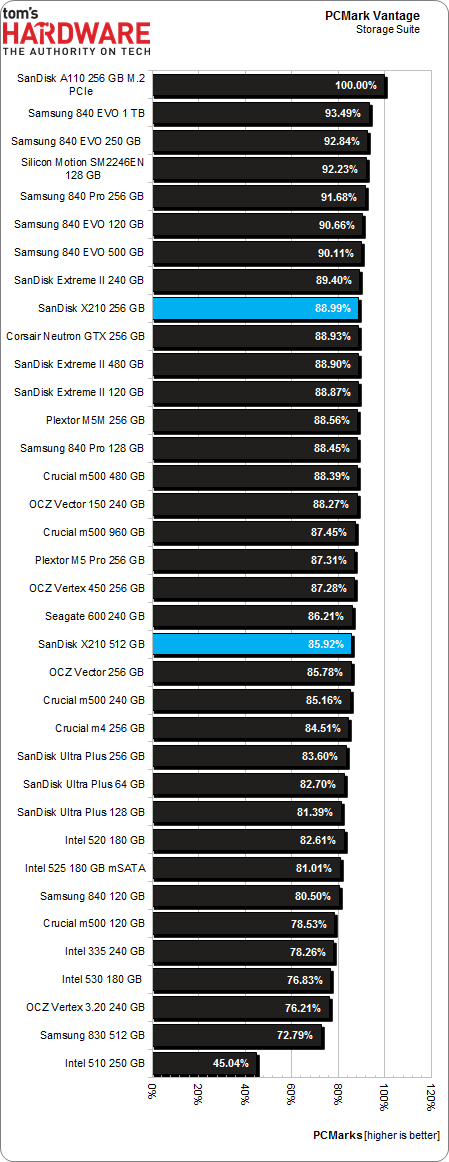SanDisk X210 256 And 512 GB: Enthusiast Speed; OEM Reliability
SanDisk's X210 SSD is both an OEM drive for major vendors and an aftermarket product for the enthusiast world. Having passed a gauntlet of validation tests, can it break into the consumer space as a true alternative to the quickest power user products?
Results: PCMark 7 And PCMark Vantage
Futuremark's PCMark 7: Secondary Storage Suite
PCMark 7 uses the same trace-based technology as our Storage Bench v1.0 for its storage suite testing. It employs a geometric mean scoring system to generate a composite, so we end up with PCMarks instead of a megabytes per second. One-thousand points separate the top and bottom, but that encompasses a far larger difference than the score alone indicates.
This test is a big improvement over the older PCMark Vantage, at least for SSD benchmarking. The storage suite is comprised of several small traces. At the end, the geometric mean of those scores is scaled with a number representing the test system's speed. The scores generated are much different from PCMark Vantage, and many manufacturers dislike it for that reason. It's hard to figure out how PCMark 7 "works" because the benchmark uses a sliding scale to generate scores. Still, it represents one of the best canned tests for storage. And, if nothing else, PCMark 7 helps reinforce the idea that the differences in modern SSDs don't necessarily translate to better experiences in average client workloads.
Instead of showing the post-processed PCMark 7 scores, this chart reflects percentages relative to the fastest drive tested (in this case, Samsung's 840 Pro 256 GB). Our interpretation isn't earth-shattering, but it likely is more meaningful than raw benchmark results. In short, SanDisk's business-oriented X210s and enthusiast-friendly Extreme IIs hit the center mass of the mid-range performance segment like a shotgun blast.
Futuremark's PCMark Vantage: Hard Drive Suite
PCMark's Vantage isn't the paragon of SSD testing, mainly because it's old and wasn't designed for the massive performance solid-state technology enables. Intended to exploit the new features in Windows Vista, Vantage was certainly at the forefront of consumer storage benching at the time. Vantage works by taking the geometric mean of composite storage scores and then scaling them a lot like PCMark 7. But in Vantage's case, this scaling is achieved by arbitrarily multiplying the geometric sub-score mean by 214.65. That scaling factor is supposed to represent an average test system of the day (a system that's now close to a decade behind the times). PCMark 7 improves on this by creating a unique system-dependent scaling factor and newer trace technology.
Why bother including this metric, then? A lot of folks prefer Vantage in spite of or because of the cartoonish scores and widespread adoption. That, and the fact that most every manufacturer uses the aged benchmark in box specs and reviewer-specific guidelines. In fairness, Vantage's Hard Drive suite wasn't designed with SSDs in mind, and is actually quite good as pointing out which 5400 RPM mechanical disk might be preferable.
Get Tom's Hardware's best news and in-depth reviews, straight to your inbox.
The two SanDisk drives end up pretty far apart from each other on the chart, but not necessarily in absolute performance.
Current page: Results: PCMark 7 And PCMark Vantage
Prev Page Results: Tom's Hardware Storage Bench, Continued Next Page Results: File Copy Performance With Robocopy-
TeraMedia Is the warranty 5 years or 3? Last page says one thing, an early page says another.Decent review, decent drives. Has THG considered doing something similar to what the car mags do, where they take certain products and use them for a year? It would be great to capture that kind of longer-term info on certain types of products, especially the kind that wear out (ODDs, fans, cases, HDDs, SSDs, etc.).Reply -
Quarkzquarkz What about Samsung SSD pro 512GB? I bought 2 of these and on that chart is only 128 and 256GBReply -
vmem @vertexxthere isn't anything particularly exciting about Kaveri going by Anand's review. I shall want for the A10 version with higher clocksReply -
smeezekitty MLC with 5k write endurance!And affordable and fast?We may very well have a new solid contender in the SSD worldReply -
RedJaron I agree with Chris. I don't need the fastest bench speeds in a SSD. Most models now are very fast and the user won't see the performance difference. I want reliability and longevity. Looks like this is a smart choice for any new builder.Reply -
jake_westmorley Can we PLEASE have some normal graphs for once? The graph on page 5 in stupid 3D is so bad it's comical. The "perspective" effect completely screws with the data. This has zero added value and is almost as bad as still using clipart.Reply -
Duff165 I find it hard to believe that the author has had "literally dozens of SSd's die" on him over the years. This would suggest that many systems have contributed to the demise of many of the SSD's being used, which seems somewhat outlandish. Just the cost factor involved in the purchase of so many SSD's and then having over a dozen of them fail, supposedly also from various companies, since if they were all from the same company it would not really be conducive to good sales. One, or maybe two I could live with, but dozens? No.Reply

